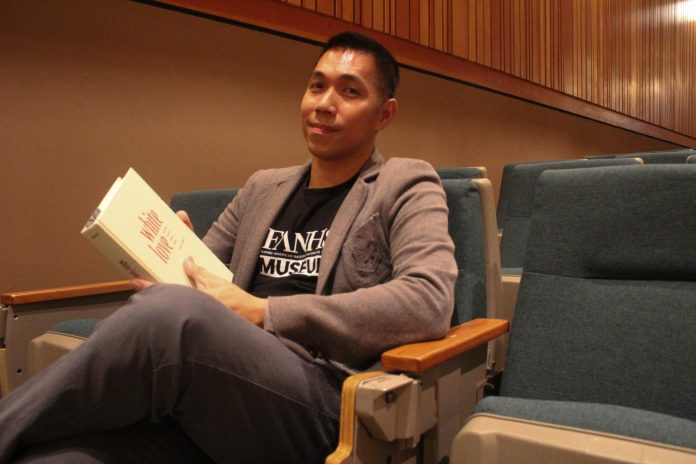Sacramento State’s Filipino American History Month Planning Committee highlights Filipino history and culture to students and faculty. The FAHM Planning Committee was formed in October 2024 during an inaugural Filipino American History Month symposium at Sac State.
The members of the committee came together as an ad hoc group to work together to honor the Philippines and make Filipino American History month more visible to Sac State students and staff. Professor Eric Claravall, member of the planning committee, said Filipino Americans are often unseen on campus.
“It’s not as often that you hear of Filipino Americans, when, in fact, we’re No. 3 in terms of population in the US, and No. 2, in terms of Asian population in the state,” Claravall said. “And yet, we don’t know much about Filipino Americans and their contribution to society.”
The planning committee said it wants audiences to empathize with the Filipino community. They use the concept called “Kapwa,” a Filipino Indigenous concept which means to recognize our shared identity as a theme to teach audiences on the hardships Filipinos faced in history.
The FAHM Planning Committee is an ad hoc committee, which is a temporary and task-specific team formed to address a specific issue in social settings. The committee members consist of Claravall, assistant professors Giselle Cunanan and Mathew Espinosa-Castro, CSU Chancellor’s Office Asian American, Native Hawaiian and Pacific Islander Student Achievement Program research analyst Mary Ann Wong and social sciences librarian Melissa Cardenas-Dow.
Cardenas-Dow, a member of the FAHM Planning Committee, said the goal is to get Sac State Filipino American students to come together and learn their history. Cardenas-Dow said she calls upon Sac State students to know about human rights, economic prosperity and social mobility in the Filipino community.
“Our hope is to be able to inspire younger [Filipino] students at Sac State to know their history and therefore know themselves,” Cardenas-Dow said. “We’ve talked to a lot of students who actually don’t have much knowledge about history in terms of migration or even what happened in the Philippines.”

This October, the FAHM committee showcased three films throughout the month at the Hinde Auditorium to tell the complex history of the Filipino community.
“This year, we wanted to highlight film as an artifact of culture but also look at the history,” Claravall said. “So part of the organizing process [was to decide] what films are we going to highlight in this film series.”
“Himala,” which premiered at the Hinde Auditorium early October, was the first film that demonstrated the ethnographic struggles of the Philippines in the ‘80s.
“Nurse Unseen” was the second film and told the history of Filipino nurses who came to the United States during World War II. It also told the stories of nurses who risked their lives treating patients during the COVID-19 pandemic.
“Delano Manongs” was their final and most recent film that told the history of the Delano Grape Strike and Boycott of 1965.
RELATED: Filipino American History Month Film Series: ‘Himala’ review
After the screening of “Nurse Unseen,” a Q&A was hosted by Cunanan with Director Michele Josue. Josue said that her film exists to tell the stories of Filipino nurses who go underappreciated by society despite their contributions.
Another Q&A panel was hosted after the screening of “Delano Manongs” with Filipino American National Historical Society Museum President Erwin Mina, as well as board members June Bond and Robert Ragsac. They talked about the strike and boycott Filipino farmers led for human rights.

Daniel Aquino, a Sac State alumnus and clinical nurse educator at the UC Davis Medical Center, attended the screening of “Nurse Unseen” and said the film highlighted the voices of Filipino nurses.
“It’s heartwarming to basically see all of my worlds coming together, somewhat like a one-stop shop,” Aquino said.
Marie Mallare, an ethics studies professor at Sac State, got her students to come watch the screening of “Delano Manongs” for their midterm and said it is important to get students immersed in the history of the Filipino community.
“I feel that if you only teach it from a perspective of historical class and lecture and you don’t immerse them in the community, then it kind of goes away,” Mallare said.
David Konzer, a third-year math major, said the film was enjoyable and informative.
“I guess in some ways [it was] uncomfortable, but a good type of uncomfortable where it’s like I feel like history is often shown to me from a good perspective,” Konzer said.

The FAHM Planning Committee wants support from Sac State to educate students on the history of the Philippines.
Cunanan said that her goal is to create a Filipino student success initiative. Right now, the FAHM planning committee is conducting research by collecting stories of Filipino American students’ struggles and wants at Sac State.
“We need to be specific and so we’re gonna enter this data collection phase,” Cuanon said.
The FAHM Planning Committee does not have an official center on campus. Claravall said his aspiration is to create a Filipino American Studies Center on campus, where students can have collective engagement, research studies and promote Filipino American history and culture.
“There’s always advertisement that this month is Filipino American History Month and I’m sure there are other places that celebrate [Filipino culture] but we want to be more in context in the university,” Claravall said.




